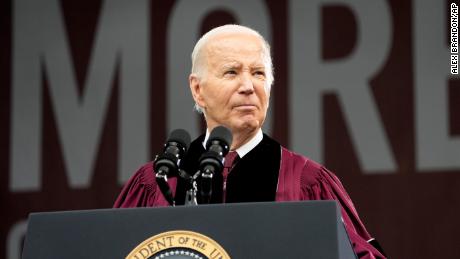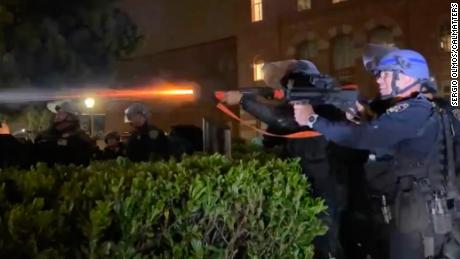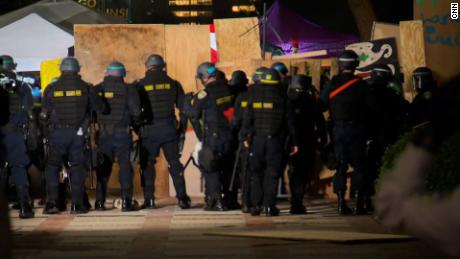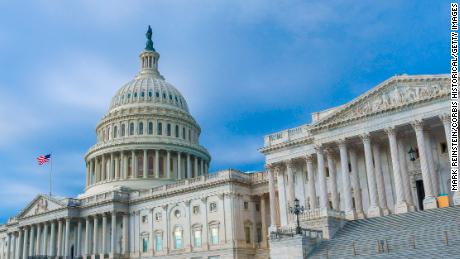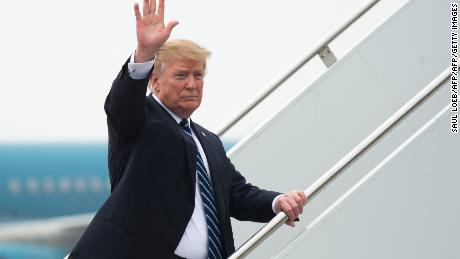Washington (CNN)Facing mounting pressure, President Donald Trump said Wednesday his administration was ordering Boeing 737 Max jets grounded until more information is gathered about the crash of an Ethiopian aircraft.
It was a turnabout from the administration's earlier position, which deemed the planes safe to fly even as dozens of other nations banned them after they were involved in two fatal disasters.
Trump said the decision to ground the Max 8 and Max 9 was made in light of new information about last week's crash, which killed 157 people. The Federal Aviation Administration said new evidence had been collected at the sight of the crash on Wednesday, and that information -- along with new satellite data -- led to the grounding decision.
Until Wednesday afternoon, administration officials had insisted the planes were safe, bucking calls from lawmakers and airline labor unions to suspend flights until an investigation could be completed.
Even as he was announcing his administration's decision, Trump said the move was more precautionary than mandatory.
"I didn't want to take any chances. We didn't have to make this decision today," he said. "We could have delayed it. We maybe didn't have to make it at all. But I felt it was important both psychologically and in a lot of other ways."
Trump said his decision was fact-based, even as he admitted it was made partly with regard for the mental well-being of American travelers.
"The safety of the American people, of all people, is our paramount concern," Trump told reporters.
Planes in the air when the announcement was made were ordered to land at their destination and remain grounded. Though Trump said airlines and pilots had been notified of the decision, one of the airlines using the plane said it was still working to confirm the order.
"We are currently seeking confirmation and additional guidance from the FAA," a Southwest Airlines spokesman said.
Speaking with reporters on a conference call, acting FAA Administrator Daniel Elwell said the grounding of the 737 Max 8 and 9 came in light of new information, including from the flight data recorder and voice recorder.
"Since this accident occurred we were resolute that we would not take action until we had data," Elwell said. "That data coalesced today."
He said the new data tied the Ethiopian airline disaster to an earlier crash of the same model plane in Indonesia.
Elwell declined to guess how long the grounding would last but he said he hoped to keep it "as short as possible:"
Trump described the airliner issue as "a terrible, terrible thing" and defended the jet's manufacturer, which he has maintained close ties to over the course of his presidency.
"Boeing is an incredible company," he said. "They are working very hard right now."
He said the company was looking to find answers to the plane issue, but "until they do, the planes are grounded."
Close ties between Boeing and Trump administration
The global grounding of Boeing's 737 Max 8 airliner had drawn new attention to the close ties between the manufacturer and the Trump administration.
Trump has touted Boeing sales across the globe -- including two weeks ago in Vietnam -- and has cultivated close relationships with the company's executives. His acting defense secretary served atop the company for more than three decades, including as the newly scrutinized planes were being developed. The company has spent millions over the past years lobbying decision-makers in Washington.
Now, as Boeing faces crumbling public confidence in one of its marquee products, those ties are being viewed in a new light.
Trump spoke by phone Wednesday with CEO Dennis Muilenburg ahead of his grounding announcement, which came during a session on drug trafficking.
A day earlier, Muilenburg assured Trump in a separate phone call the 737 Max 8 was safe, despite the two recent crashes. Hours after that call, the FAA said it remained confident in the planes, even as governments across Europe and Asia grounded them.
That view changed by midday, as Canada's minister of transport said the country would no longer allow Boeing 737 Max 8 or 9 aircraft to take off or land in Canada. A day earlier, the European Union suspended operations of the model. That followed announcements from countries in Asia, Africa and the Middle East declaring use of the plane forbidden, for now.
Startling real-time flight tracking maps showed the plane flying only over North America -- and nowhere else -- as the White House and the FAA continued to deem the aircraft safe.
While the President was not explicitly pushing for the grounding over the last 24 hours, Canada's decision made it untenable for the US to hold out, according to an official familiar with the matter.
The President was eager to act given the public pressure, the official said, but it was the satellite data that finalized the decision on the grounding order.
Despite the initial reluctance to ground the planes, Trump insisted on Wednesday his administration had acted quickly and "fact-based" in response to the crash, which occurred on Sunday.
Democratic and GOP lawmakers had been agitating for a ban on the plane. Senators calling for a temporary grounding of the planes included Republicans Mitt Romney, the 2012 presidential nominee, and Ted Cruz, who chairs a subcommittee on aviation and space. Sen. Roger Wicker, another Republican, announced the Commerce Committee he chairs would hold a hearing on the matter.
Sen. Richard Blumenthal, a Connecticut Democrat who sits on the Senate Commerce, Science and Transportation Committee, said the partial government shutdown at the start of the year may have affected the FAA's ability to execute planned software changes on the Max 8 planes. But the FAA's Elwell denied the shutdown affected anything.
"We just got confirmation that the shutdown did not cause any delay in work on the software -- the software addition to the MAX," he told reporters Wednesday.
Mixed messaging
Helmed by an acting administrator for more than a year, the FAA finds itself the focus of congressional and public scrutiny for its role in inspecting and ensuring the safety of Boeing airplanes. Some US pilots who fly the Boeing 737 Max registered complaints about the way the jet has performed in flight, according to a federal database accessed by CNN.
One of the pilot complaints from the federal database include a report saying it is "unconscionable" that Boeing, the FAA and the pilot's airline (which was unnamed) would have pilots flying the aircraft without adequate training or sufficient documentation.
The same entry also charges that the flight manual for the 737 Max 8 "is inadequate and almost criminally insufficient."
The FAA didn't respond to a request for comment about the complaints.
Trump was expected to name Steve Dickson, a former Delta executive, to the permanent FAA administrator role as of last week, according to a senior administration official.
The President made the selection before the current Boeing controversy, and the timing of any announcement isn't clear. The official said no nomination is considered final until Trump makes his decision public.
The administrator role has been filled in an acting capacity by deputy administrator Elwell for more than a year. Dickson was Delta's senior vice president for flight operations and is a former military and commercial pilot, including of earlier versions of the 737 aircraft.
Trump initially wanted to name the pilot of his personal jet, John Dunkin, to the job but faced questions about Dunkin's qualifications. Trump has long cast himself as an authority on air travel and aviation, including in a tweet on Tuesday.
"Airplanes are becoming far too complex to fly. Pilots are no longer needed, but rather computer scientists from MIT," he wrote, adding: "I don't know about you, but I don't want Albert Einstein to be my pilot. I want great flying professionals that are allowed to easily and quickly take control of a plane!"
Shanahan connection
Asking on Capitol Hill Tuesday whether the planes were safe to fly, acting Defense Secretary Patrick Shanahan -- who was an executive at Boeing for 31 years, including overseeing commercial aircraft -- demurred.
"Let me just say this: my condolences go out to all the all the families on Ethiopian Airlines," he said. "These situations, as you well know, are very serious and let's let the FAA and others take command of the situation and trust that part of the process."
Shanahan has faced accusations of being overly warm to his former employer in his Pentagon role, including in a new request filed Wednesday by a government watchdog group asking the Defense Department's inspector general to investigate whether Shanahan violated government ethics rules.
The complaint cites news reports claiming Shanahan has promoted Boeing's products over rival Lockheed Martin in his official tenure.
"It is extremely disturbing that acting Secretary Shanahan appears to be using his public office for Boeing's private gain," said Noah Bookbinder, executive director of Citizens for Responsibility and Ethics in Washington, which filed the complaint. "Ethics rules make clear that government employees cannot abuse their offices to promote a private company, much less work on official matters involving their former employer."
Shanahan wouldn't be alone in promoting Boeing's products. It was only two weeks ago that Trump himself oversaw the sale of 100 of the 737 Max planes while in Hanoi for a summit with Kim Jong Un.
Ahead of his nuclear talks, Trump participated in a trade singing ceremony with a number of airline executives inside the Vietnamese presidential palace. Among them was Kevin McAllister, Boeing's executive vice president CEO of Boeing Commercial Airplanes.
Among the agreements was a deal between Boeing and VietJet, a low-cost airline based in Hanoi, for 100 of the 737 Max planes -- 80 of the Max 10 variety, and 20 of the Max 8, the aircraft current under scrutiny. Boeing said the order was worth $12.7 billion.
Now, Vietnam says the safety issues must be resolved before the planes can fly.
CNN's Fredreka Schouten, Greg Wallace and Annie Grayer contributed to this report.








